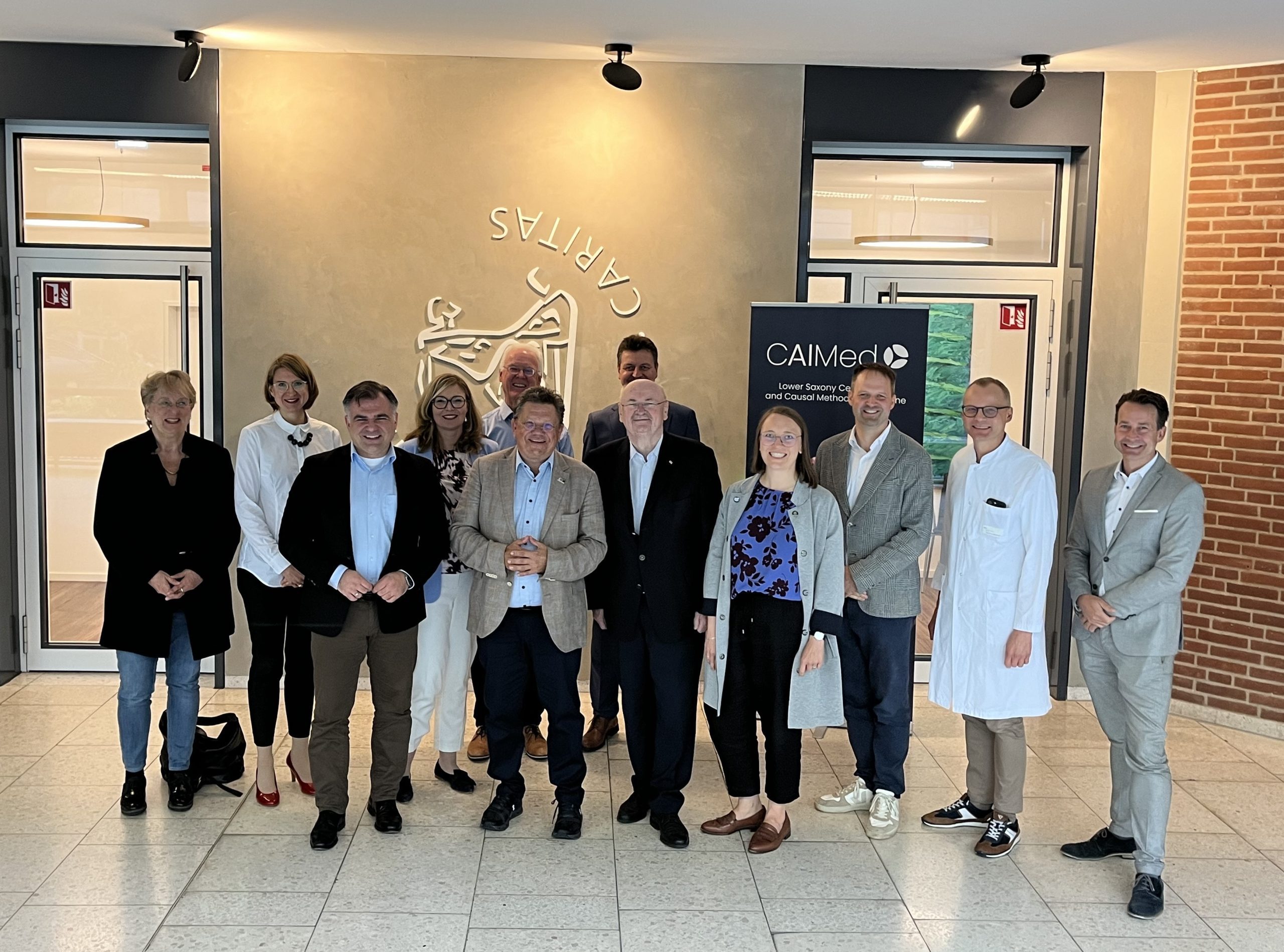(From left to right): Karin Reinelt, Dr. Katharina Hupa-Breier, Dr. Christos Pantazis, Helena Kühnemund, Prof. Dr. Wolfgang Nejdl, Dr. Andreas Philippi, Prof. Dr. Wolfgang Manns, Prof. Dr. Michael Marschollek, Anna Kley, Dr. Johannes Winter, Prof. Dr. Heiner Wedemeyer, Dr. Timm Kappenberg
How is artificial intelligence (AI) revolutionizing structured healthcare? What opportunities does it offer, particularly for the prevention and treatment of chronic diseases such as diabetes? These and other forward-looking questions were discussed by experts from the CAIMed research center, the Diabetes@Work initiative and political decision-makers at an expert discussion at Hannover Medical School.
The discussion was opened by Prof. Dr. Michael Manns, President of Hannover Medical School (MHH) and member of CAIMed's Supervisory Board, who welcomed Dr. Andreas Philippi, Lower Saxony's Minister for Social Affairs, Labour, Health and Equality, and Dr. Christos Pantazis, Member of the Bundestag for Lower Saxony. In his keynote speech, Prof. Dr. Wolfgang Nejdl, Speaker of the CAIMed Board of Directors, gave the guests an insight into the diverse potential of trustworthy AI methods in medicine. CAIMed Director Prof. Dr. Michael Machollek presented a prediction model for early sepsis prediction in the children's intensive care unit and AI image processing in radiology, CAIMed use cases that can already achieve a decisive improvement in patient care today. Prof. Dr. Heiner Wedemeyer (MHH) then spoke about the future potential of AI in the early detection and stratification of high-risk patients and presented plans for a screening program in the corporate environment that is currently being developed with Volkswagen AG. Dr. Katharina Hupa-Breier, MHH expert in nutritional medicine, then drew attention to the holistic view and treatment of metabolic syndrome, which is one of the greatest challenges facing the healthcare system.
In view of the great potential of AI technology for medical prevention, Helena Kühnemund from Lilly Deutschland presented the Diabetes@Work initiative, which focuses in particular on the workplace as a central location for successful prevention work. Her proposal to use AI to identify high-risk patients in disease management programs (DMPs) sparked a constructive discussion.
In the discussion moderated by Dr. Johannes Winter (CAIMed) and the Diabetes@Work initiative, Minister Dr. Andreas Philippi emphasized the key role that AI plays for sustainable healthcare systems. It is a major challenge to implement and politically prioritize prevention programmes, which often only have a long-term effect. Dr. Christos Pantazis outlined possible solutions for this, such as the integration of AI methods into the upcoming reform of disease management programs. He emphasized that this requires both appropriate incentives and a clear legal framework, for example through the Healthcare Reinforcement Act (GVSG), in order to collect meaningful data and anchor innovative solutions in the healthcare sector.
Dr. Timm Kappenberg from the Association of German Company Physicians, partner of the Diabetes@Work initiative, reported on a project by VW and the MHH for the early detection of liver disease and underlined the essential role of company medicine in prevention. There are great untapped opportunities here if more data could be collected and evaluated. Minister Philippi and Dr. Pantazis also agreed that digitalized and prevention-oriented healthcare was not only desirable, but essential.
At the end of the event, it was clear that AI offers enormous opportunities for medical care, particularly in the fight against and prevention of chronic diseases. There is a consensus that close cooperation between research, industry and politics is essential in order to fully exploit the potential of future technologies.
Written by Elisa Brocksieper and Dr. Johannes Winter


